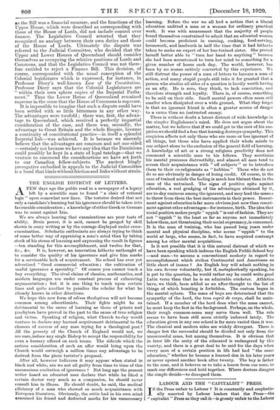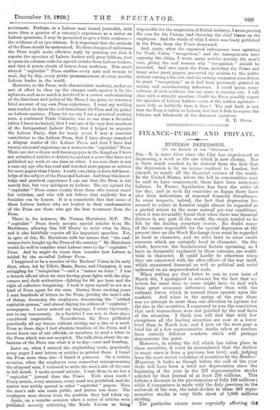LABOUR AND THE " CANT MUST " PRESS.
TS the Press unfair to Labour ? It is constantly and emphatic- ally asserted by Labour leaders that the Press—the " capitalist " Press as they call it—is grossly unfair to the Labour
movement. Perhaps, as a Labour man turned journalist, with more than a quarter of a century's experience as a writer on Labour questions, I may be permitted to give a little evidence— the evidence of an eye-witness. It is important that the attitude of the Press should be understood. To these charges of unfairness the Press might make effective reply by pointing out that it reports the speeches of Labour leaders with great fullness, that it opens its columns wide for special articles from Labour leaders, and that it prints shoals of letters from workmen. This much abused " capitalist " Press enables every man and woman to read, day by day, every public pronouncement of every notable Labour leader in the world.
However, as the Press, with characteristic modesty, makes no sort of effort to clear up the charges made against it by the agitators, and as so much is involved in a correct understanding of the functions and policy of the Press, I am going to venture a brief account of my own Press experience. I want my working menreaders to know the real facts about the Press and its policy on Labour matters. Please let me say I am a practical working man, a confirmed Trade Unionist, was at one time a Socialist (when I know no better), that I was one of the very first members of the Independent Labour Party, that I helped to organize the Labour Party, that for many years I was a constant contributor to the Labour Press, that I have always remained a diligent reader of tha Labour Press, and that I have had twenty-six years' experience as a writer to the "capitalist" Press. There are not a dozen well-known papers in the Kingdom I have not submitted articles or letters to, and not a score that have not published my work at one time or other. I am sure there is not a man my age who has read and watched more papers or written for more papers than I have. I really can claim to have full know- ledge of the subject of the Press and Labour. And from this know- ledge and practical experience I can say that the Press is not merely fair, but very indulgent to Labour. The cry against the " capitalist " Press comes mainly from those who cannot stand fair criticism, and who will not believe that anybody but a Socialist can be honest. It is a remarkable fact that some of those Labour leaders who are loudest in their condemnation of the Press are those who get the best treatment from the Press.
There is, for instance, Mr. Vernon Hartshorn, M.P. The " capitalist " Press freely accepts special articles from Mr. Hartshorn, allowing him full liberty to write what he likes, and it also faithfully reports all his important speeches. Yet, in spite of this, Mr. Hartshorn tells his minors that " the coal- owners have bought up the Press of the country." Mr. Hartshorn would do well to consider what Labour owes to the " capitalist " Press. And he might do worse than consider how Labour is misled by the so-called Labour Press.
I happened to be a member of the Dockers' Union in its early days, when, led by Tillett, Mann, Burns, and Champion, it was struggling for " recognition "—and a " tanner an hour." I was a branch official when we were having great fights with the ship- owners and dock authorities—fighting for 6d. per hour and the right of collective bargaining. I took it upon myself to act as a kind of Press agent for the men. During those exciting years I sent hundreds of letters to the Press, putting the men's side of things, trouncing the employers, denouncing the " wicked capitalist system," and almost flaying the editors of " capitalist " newspapers. I never minced my language. I wrote vigorously, not to say venomously. As a Socialist I was not, in those days, considered respectable. Nevertheless, the Press published practically all my letters without cutting out a line or a word. Even in those days I had absolute freedom of the Press, and I never 'mew one of our officials, or members, to send a letter to the Press which was not accepted. The talk, then, about the un- fairness of the Press was what it is to-day—cant and humbug.
Later on, when I entered the shipbuilding trade, practically every paper I sent letters or articles to printed them. I found the Press more than fair—I found it generous. On a certain occasion, when the employers were somewhat misrepresenting the shipyard men, I ventured to write the men's side of the case in full detail. I wrote several articles. I sent them to no less a " capitalist " journal than the Times. With what result ? Every article, every sentence, every word was published, and the matter was widely quoted in other " capitalist " papers. Thus the men's side was made public, and justice was done. The employers were driven from the position they had taken up. Again, on a notable occasion when a series of articles were published severely criticizing the Trade Unions as being responsible for the stagnation of British industry, I wrote putting the case for the Unions, and throwing the chief blame on the employers. And the whole of what I wrote was freely published in the Press, from the Times downward.
And, again, when the organized railwaymen were agitating for Trade Union " recognition," and the managements were opposing the claim, I wrote many articles putting the men's case, giving the real reasons why " recognition " should be accorded. And once again the Press, including the Times and many other great papers, presented my articles to the public without cutting a line out, and the railway magnates wore driven to grant " recognition," as it had been previously granted in mining and manufacturing industries. I could quote many columns of such evidence, but my space is running out. I will close with a straight question : Could the Press possibly report the speeches of Labour leaders—even of the wildest agitators— more fully or faithfully than it does ? The real fault is not that tho Press is unfair to Labour, but that it fails to expose the fallacies and falsehoods of the dishonest agitators.
E. T. Goon.







































 Previous page
Previous page